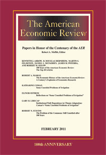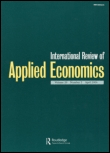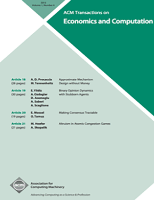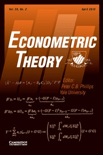
ECONOMETRICA
Scope & Guideline
Inspiring the next generation of economic scholars.
Introduction
Aims and Scopes
- Econometric Theory:
The journal consistently publishes papers that advance econometric theory, including methods for estimation, inference, and model selection, which are foundational for empirical research. - Applied Econometrics:
ECONOMETRICA features studies that apply econometric techniques to real-world data, addressing significant economic questions and policy implications. - Game Theory and Mechanism Design:
Research in this area explores strategic interactions among agents and the design of economic mechanisms, contributing to understanding how institutions and policies can be structured. - Behavioral Economics:
The journal includes work that bridges economics and psychology, examining how cognitive biases and social factors influence economic decisions. - Development Economics:
Papers often focus on issues pertinent to developing economies, including labor markets, inequality, and the impacts of policies on economic growth. - Environmental and Resource Economics:
Research addressing the economic aspects of environmental issues and resource management is a notable area, reflecting the growing importance of sustainability in economic research. - Network Economics:
The journal has a strong focus on the analysis of economic networks, exploring how connections between agents affect economic outcomes.
Trending and Emerging
- Data-Driven Econometrics:
There is a growing emphasis on data-driven methodologies, including machine learning and big data applications in econometrics, showcasing the integration of computational techniques into economic analysis. - Behavioral Insights in Economic Models:
Research incorporating behavioral economics into traditional models is on the rise, illustrating a shift towards understanding how psychological factors influence economic decision-making. - Experimental and Quasi-Experimental Methods:
The trend towards using experimental designs and quasi-experimental methods is increasing, providing robust evidence for causal inference in economic research. - Climate Economics and Policy Analysis:
As climate change becomes a more pressing issue, research focusing on environmental economics and the economic impacts of climate policy is gaining prominence. - Network Theory Applications:
The application of network theory to economic problems, particularly in understanding complex interdependencies in markets and organizations, is emerging as a significant area of interest. - Inequality and Economic Mobility Studies:
Research examining economic inequality and mobility has become increasingly relevant, reflecting societal concerns and the implications of policy choices on equity.
Declining or Waning
- Traditional Labor Economics:
Papers specifically focused on traditional labor economics topics, such as wage determination and employment models, have decreased, possibly as newer interdisciplinary approaches gain traction. - Static Models of Economic Behavior:
There has been a noticeable decline in the publication of static models, as researchers increasingly favor dynamic models that better capture the complexities of economic behavior over time. - Simple Linear Regression Models:
The use of basic linear regression models appears to be waning, with a shift towards more complex and robust econometric techniques that address issues like heteroskedasticity and endogeneity. - Conventional Market Structures:
Research that strictly adheres to conventional market structure analysis is less prominent, with more focus on the implications of market power and behavioral economics.
Similar Journals

AMERICAN ECONOMIC REVIEW
Leading the Charge in Economic Scholarship Since 1973.AMERICAN ECONOMIC REVIEW, published by the American Economic Association, stands as one of the most prestigious academic journals in the field of Economics and Econometrics. With an impressive impact factor and ranking of #9 out of 716 in its category, this journal has achieved a notable position within the top 2% of journals globally, as evidenced by its Q1 classification in 2023. Covering a broad spectrum of economic theory and applied research, it serves as a primary platform for the dissemination of high-quality scholarly work, contributing significantly to the ongoing dialogue within the discipline. Although Open Access options are not available, the journal's rigorous peer-review process ensures that published articles uphold the highest standards of academic integrity and relevance. With coverage spanning from 1973 to 2024, the AMERICAN ECONOMIC REVIEW continues to be an essential resource for researchers, professionals, and students eager to stay at the forefront of economic thought and innovation.

Review of Economic Design
Transforming Theoretical Frameworks into Practical Solutions.Review of Economic Design, published by Springer Heidelberg, is a distinguished journal that serves as a vital platform for researchers in the field of economics, econometrics, and finance. Established in 1996, the journal focuses on the advancement and dissemination of economic designs and models, contributing innovative theoretical frameworks and empirical analyses that influence economic policy and practice. With a commendable Q2 category ranking in the 2023 quartiles for its field, it features rigorous peer-reviewed articles that cover a broad array of topics within economics. Although it currently does not offer open access options, the journal's commitment to academic excellence is reflected in its comprehensive and methodologically sound publications. Scholars and practitioners alike benefit from engaging with the cutting-edge research presented in this journal, which encompasses both foundational studies and contemporary issues shaping the economic landscape. For those keen to stay abreast of the latest developments, Review of Economic Design is an essential resource, promising insightful contributions through the year 2024 and beyond.

Econometrics, published by MDPI, is a prominent open access journal based in Switzerland, dedicated to advancing research in the fields of economics and econometrics. Since its inception in 2013, this journal has been pivotal in disseminating innovative theories and empirical findings, fostering an engaging dialogue among scholars and practitioners. With an impressive Q2 ranking in the 2023 category of Economics and Econometrics and a solid position at #378 out of 716 in Scopus rankings, it stands as a vital resource for those seeking to enhance their understanding and application of econometric methods. The journal offers immediate open access to its published articles, ensuring that researchers, professionals, and students alike can easily access and contribute to the evolving body of knowledge in this essential discipline. The scope of Econometrics encourages submissions that cover a broad array of topics, making it a dynamic platform for innovative research until 2024 and beyond.

International Review of Applied Economics
Driving Policy Change with Empirical EvidenceInternational Review of Applied Economics is a leading journal dedicated to the dissemination of innovative research in the fields of economics and econometrics. Published by Routledge Journals, a renowned name in academic publishing under Taylor & Francis Ltd., this journal has established itself as a key resource for scholars, practitioners, and decision-makers. With an impressive Q2 ranking in the category of Economics and Econometrics, and positioned in the 70th percentile based on Scopus rankings, it provides a platform for high-quality, peer-reviewed articles that address contemporary economic issues. The journal aims to facilitate the understanding of applied economic theory and practice, and it accepts a diverse range of contributions including empirical studies, theoretical analyses, and methodological advancements. Operating from the United Kingdom, it has been a significant contributor to the academic dialogue since its inception in 1987, fostering knowledge exchange through rigorous scholarship. Researchers, professionals, and students alike will find valuable insights that inform policy-making and economic strategy in its pages.

ACM Transactions on Economics and Computation
Transforming Economic Research with Computational PrecisionACM Transactions on Economics and Computation, published by the Association for Computing Machinery, is a premier scholarly journal that bridges the fields of economics and computation. With an ISSN of 2167-8375 and an E-ISSN of 2167-8383, this journal has carved out a significant niche since its inception in 2013, and is set to run through 2024. Its multidisciplinary scope encompasses various quarters, being ranked Q1 in Computer Science (miscellaneous) and Q2 in Computational Mathematics, Economics and Econometrics, Marketing, and Statistics and Probability as of 2023. The journal not only ranks impressively in Scopus—positioned within the top 25% for several categories—but also fosters a collaborative environment where researchers, professionals, and students can engage with cutting-edge research that showcases innovative methodologies and theoretical advancements. Although it is not open access, the journal remains vital for advancing knowledge at the intersection of computation and economics, making it an essential resource for those looking to understand the complexities of these dynamic fields.

Economic Theory Bulletin
Cultivating a vibrant community of economic theorists and practitioners.Welcome to the Economic Theory Bulletin, a premier journal dedicated to advancing the field of economic theory. Published by SPRINGER HEIDELBERG, this journal serves as a critical platform for researchers and professionals to disseminate innovative ideas and research findings that shape economic discourse. With an ISSN of 2196-1085 and an E-ISSN of 2196-1093, the Economic Theory Bulletin invites contributions that address theoretical advancements and empirical applications in economics, fostering insightful dialogue among scholars. Although the journal operates under a traditional access model, it remains committed to high-quality, peer-reviewed scholarship that meets the rigorous standards of the academic community. The diverse range of articles published here not only contributes to the theoretical foundations of economics but also emphasizes real-world applications, making it an essential resource for students and professionals alike. The journal’s impact on the evolving landscape of economic theory ensures that it remains a vital reference point for the latest research and trends in the field.

ECONOMETRIC THEORY
Advancing the Frontiers of Econometric ResearchECONOMETRIC THEORY is a premier journal published by Cambridge University Press, specializing in the intricate field of econometrics. With a strong commitment to advancing economic research since its inception in 1985, this journal has earned a distinguished reputation as reflected by its Q1 rankings in both Economics and Econometrics, as well as in Social Sciences (miscellaneous) categories for 2023. With ISSN 0266-4666 and E-ISSN 1469-4360, it serves as an invaluable resource for scholars, researchers, and practitioners who seek to contribute to the field through high-quality, impactful research. Although open access is not available, the journal ensures rigorous peer review and publication standards, solidifying its position as a vital platform for disseminating crucial findings in econometric methodology, empirical applications, and theoretical advancements. With an impressive Scopus ranking, particularly within its broad categories, ECONOMETRIC THEORY is essential reading for those looking to stay at the forefront of research in econometrics.

International Advances in Economic Research
Connecting Theory and Practice in the Economics LandscapeInternational Advances in Economic Research, published by SPRINGER, stands as a significant resource within the field of economics and econometrics, consistently contributing to the theoretical and empirical understanding of economic phenomena since its inception in 1995. With an ISSN of 1083-0898 and E-ISSN of 1573-966X, this journal is dedicated to advancing economic research through a rigorous peer-review process and disseminating high-quality scholarly articles. The journal's esteemed classification places it in the third quartile (Q3) within the Economics and Econometrics category for 2023, indicating its respectable standing in academic circles. It serves as an important conduit for the dissemination of innovative economic theories, data analysis, and policy discussions, appealing to researchers, professionals, and students alike. Though not an open-access journal, it provides valuable subscription-based content that enriches the understanding of diverse economic issues and fosters a community of inquiry among academics. With its projected outlook extending to 2024, International Advances in Economic Research continues to be an essential platform for scholars aiming to influence and engage with contemporary economic debates.

Ekonomika i Matematiceskie Metody-Economics and Mathematical Methods
Pioneering New Frontiers in Economic Research and MethodologyEkonomika i Matematiceskie Metody - Economics and Mathematical Methods is a distinguished journal published by the esteemed Russian Academy of Sciences and the State Academy of Humanities (GAUGN). It serves as a vital resource in the interdisciplinary field of economics and mathematical applications, focusing on advanced theories, methodologies, and quantitative techniques that drive economic research and practice. With an ISSN of 0424-7388, this journal is geared towards researchers, professionals, and students who seek to contribute to the evolving landscape of economic theory and mathematics. Although the journal does not currently offer open access, it remains committed to fostering rigorous academic discourse. Through its insightful articles, Ekonomika i Matematiceskie Metody plays a crucial role in disseminating influential concepts and methodologies, making it an essential publication within the realm of economic sciences.

Panoeconomicus
Pioneering Open Access Research in EconomicsPanoeconomicus is a renowned academic journal published by SAVEZ EKONOMISTA VOJVODINE, specializing in the evolving fields of Economics, Econometrics, and Finance. Since its inception as an Open Access publication in 2006, this journal has fostered a collaborative environment for scholars and practitioners to disseminate research that contributes to critical economic discourses. Based in Serbia, and operating within an international context, Panoeconomicus carries an impressive Scopus Rank in the 57th percentile, further reflected in its Q3 category quartile for Economics, Econometrics, and Finance as of 2023. With a commitment to enhancing academic dialogue through readily accessible content, the journal is instrumental in shaping new insights and methodologies available to researchers, finance professionals, and students alike. Its significance in the field continues to grow, particularly as it addresses pressing economic challenges from 2009 to 2024 and beyond, making it a valuable resource for those aiming to stay at the forefront of economic research.